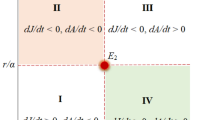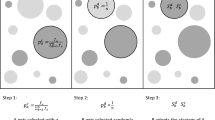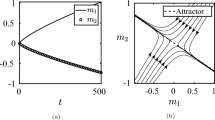Abstract
Over the past decade, inequality has become one of the most complex and troubling challenges in the global economy. Many scientists are determined to eliminate inequality to achieve full cooperation. However, our research shows that not all inequalities hinder cooperation. In this article, we study the effects of inequality by introducing the disassortative mixing of the investment amount and enhancement factor assigned to certain individuals in the public goods game. Compared with the traditional version, we find that cooperation can be effectively promoted by aligned inequality, which means that individuals with the highest (lowest) investment capabilities contribute the greatest (lowest) investment amounts. The promotion of cooperation mainly depends on the heterogeneous contribution ability of players. Specifically, cooperators with high contribution ability can maximize collective benefits, causing cooperators with low contribution ability to form compact clusters and resist invasion by defectors. Our research indicates that the diversity of individual endowment and productivity may have a non-negligible influence on the evolution of cooperation among selfish individuals.
Graphic Abstract
The frequency of cooperation \(\rho _{c}\) as a function of the enhancement factor r for different correlation coefficients.









Similar content being viewed by others
Data Availability Statement
This manuscript has no associated data or the data will not be deposited. [Authors’ comment: This article has no additional data.]
References
J.M. Smith, Evolution and Theory of Games. Am. Sci. 64(1), 41–45 (1975)
J.F. Hauer, D.J. Trudnowski, G. Rogers, B. Mittelstadt, J. Johnson, Evolutionary games and population dynamics. IEEE Comput. Appl. Power 10(4), 50–54 (1998)
M.A. Nowak, A. Sasaki, C. Taylor, D. Fudenberg, Emergence of cooperation and evolutionary stability in finite populations. Nature 428(6983), 646 (2004)
G.S. Wilkinson, Reciprocal food sharing in the vampire bat. Nature 308(5955), 181–184 (1984)
M. Milinski, Tit for tat in sticklebacks and the evolution of cooperation. Nature 325(6103), 433–435 (1987)
M.A. Nowak, K. Sigmund, Tit for tat in heterogeneous populations. Nature 355(6357), 250–253 (1992)
C.Y. Xia, J. Zhao, J. Wang, Y.L. Wang, H. Zhang, Influence of vertex weight on cooperative behavior in a spatial snowdrift game. Phys. Scr. 84(2), 25802(6)–25807 (2011)
A. Szolnoki, M. Perc, Correlation of positive and negative reciprocity fails to confer an evolutionary advantage: Phase transitions to elementary strategies. Phys. Rev. X 3(4), 041021 (2013)
G. Hardin, The Tragedy of the Commons. Science 162(3859), 1243–1248 (1968)
M.A. Nowak, Five rules for the evolution of cooperation. Science 314(5805), 1560–1563 (2006)
M. Perc, A. Szolnoki, G. Szabó, Restricted connections among distinguished players support cooperation. Phys. Rev. E 78(6), 066101 (2008)
A. Szolnoki, M. Perc, G. Szabó, Phase diagrams for three-strategy evolutionary prisoner’s dilemma games on regular graphs. Phys. Rev. E 80(5), 056104 (2009)
H. Zhang, M. Small, H. Yang, B. Wang, Adjusting learning motivation to promote cooperation. Physica A 389(21), 4734–4739 (2010)
A. Szolnoki, M. Perc, Impact of critical mass on the evolution of cooperation in spatial public goods games. Phys. Rev. E 81(5), 57101 (2010)
Z. Wang, M. Perc, Aspiring to the fittest and promotion of cooperation in the prisoner’s dilemma game. Phys. Rev. E 82(2), 021115 (2010)
Z. Wang, Z. Wang, X. Zhu, J.J. Arenzon, Cooperation and age structure in spatial games. Phys. Rev. E 85(1), 011149 (2012)
Z. Wang, A. Szolnoki, M. Perc, If players are sparse social dilemmas are too: Importance of percolation for evolution of cooperation. Sci. Rep. 2(1), 369 (2012)
C. Shen, J. Lu, L. Shi, Does coevolution setup promote cooperation in spatial prisoner’s dilemma game? Appl. Math. Comput. 290, 201–207 (2016)
J. Jin, C. Shen, C. Chu, L. Shi, Incorporating dominant environment into individual fitness promotes cooperation in the spatial prisoners’ dilemma game. Chaos, Solitons Fractals 96, 70–75 (2017)
H. Guo, C. Shen, D. Dai, M. Zhang, C. Chu, L. Shi, Environment promotes the evolution of cooperation in spatial voluntary prisoner’s dilemma game. Appl. Math. Comput. 315, 47–53 (2017)
C. Shen, X. Li, L. Shi, Z. Deng, Asymmetric evaluation promotes cooperation in network population. Physica A 474, 391–397 (2017)
M. Kupennan, G. Abramson, The Structure and Dynamics of Networks, in Small World Effect in an Epidemiological Model. (Princeton University Press, 2011), pp. 489–492
Z.X. Wu, X.J. Xu, Y. Chen, Y.H. Wang, Spatial prisoner’s dilemma game with volunteering in Newman-Watts small-world networks. Phys. Rev. E 71(3), 037103 (2005)
X. Chen, L. Wang, Promotion of cooperation induced by appropriate payoff aspirations in a small-world networked game. Phys. Rev. E 77(2), 017103 (2008)
F.C. Santos, M. Santos, J.M. Pacheco, Social diversity promotes the emergence of cooperation in public goods games. Nature 454(7201), 213 (2008)
H.X. Yang, W.X. Wang, Z.X. Wu, Y.C. Lai, B.H. Wang, Diversity-optimized cooperation on complex networks. Phys. Rev. E 79(5), 56107 (2009)
W.B. Du, X.B. Cao, M.B. Hu, W.X. Wang, Asymmetric cost in snowdrift game on scale-free networks. EPL (Europhysics Letters) 87(6), 60004 (2009)
W.X. Wang, R. Yang, Y.C. Lai, Cascade of elimination and emergence of pure cooperation in coevolutionary games on networks. Phys. Rev. E 81(3), 035102 (2010)
Z. Wang, A. Szolnoki, M. Perc, Evolution of public cooperation on interdependent networks: The impact of biased utility functions. EPL (Europhysics Letters) 97(4), 48001 (2012)
M. Perc, P. Grigolini, Collective behavior and evolutionary games-an introduction. Chaos Solitions Fractals 56(0960–0779), 1–5 (2013)
Z. Wang, L. Wang, A. Szolnoki, M. Perc, Evolutionary games on multilayer networks: a colloquium. Eur. Phys. J. B 88(5), 1–15 (2015)
Z. Wang, L. Wang, M. Perc, Degree mixing in multilayer networks impedes the evolution of cooperation. Phys. Rev. E 89(5), 052813 (2014)
M. Perc, A. Szolnoki, Social diversity and promotion of cooperation in the spatial prisoner’s dilemma game. Phys. Rev. E 77(1), 011904 (2008)
C. Chu, Y. Zhai, C. Mu, D. Hu, T. Li, L. Shi, Reputation-based popularity promotes cooperation in the spatial prisoner’s dilemma game. Appl. Math. Comput. 362, 124493 (2019)
K. Sigmund, C. Hauert, M.A. Nowak, Reward and punishment. Proc. Natl. Acad. Sci. 98(19), 10757–10762 (2001)
A. Szolnoki, M. Perc, Reward and cooperation in the spatial public goods game. EPL (Europhysics Letters) 92(3), 38003 (2010)
A. Szolnoki, M. Perc, Evolutionary advantages of adaptive rewarding. New J. Phys. 14(9), 093016 (2012)
C. Du, D. Jia, L. Jin, L. Shi, The impact of neutral reward on cooperation in public good game. Eur. Phys. J. B 91(10), 1–6 (2018)
H. Brandt, C. Hauert, K. Sigmund, Punishment and reputation in spatial public goods games. Proc. R. Soc. Lond. B 270(1519), 1099–1104 (2003)
D. Helbing, A. Szolnoki, M. Perc, G. Szabó, Evolutionary establishment of moral and double moral standards through spatial interactions. PLoS Comput. Biol. 6(4), e1000758 (2010)
J. Liu, H. Meng, W. Wei, L. Tong, Y. Yong, Synergy punishment promotes cooperation in spatial public good game. Chaos Solitons Fractals 109, 214–218 (2018)
M. Perc, A. Szolnoki, Coevolutionary games–A mini review. Biosystems 99(2), 109–125 (2009)
C. Chen, J. Liu, S. Chen, J. Jin, S. Lei, Coevolution of game strategy and link weight promotes cooperation in structured population. Chaos Solitons Fractals 104, 28–32 (2017)
C. Shen, C. Chu, L. Shi, M. Jusup, M. Perc, Z. Wang, Coevolutionary resolution of the public goods dilemma in interdependent structured populations. EPL (Europhysics Letters) 124(4), 48003 (2018)
T. Piketty, E. Saez, Inequality in the long run. Science 344(6186), 838–843 (2014)
M. Scheffer, B. van Bavel, I.A. van de Leemput, E.H. van Nes, Inequality in nature and society. Proc. Natl. Acad. Sci. 114(50), 13154–13157 (2017)
T.L. Cherry, S. Kroll, J.F. Shogren, The impact of endowment heterogeneity and origin on public good contributions: evidence from the lab. J. Econ. Behav. Organ. 57(3), 357–365 (2005)
S. Heap, A. Ramalingam, B.V. Stoddard, Endowment inequality in public goods games: A re-examination. Econ. Lett. 146, 4–7 (2016)
O.P. Hauser, G.T. Kraft-Todd, D.G. Rand, M.A. Nowak, M.I. Norton, Invisible inequality leads to punishing the poor and rewarding the rich. Behav. Public Policy 5(3), 333–353 (2021)
A. Nishi, H. Shirado, D.G. Rand, N.A. Christakis, Inequality and visibility of wealth in experimental social networks. Nature 526(7573), 426–429 (2015)
O.P. Hauser, C. Hilbe, K. Chatterjee, M.A. Nowak, Social dilemmas among unequals. Nature 572(7770), 524–527 (2019)
A. Szolnoki, M. Perc, G. Szabó, Topology-independent impact of noise on cooperation in spatial public goods games. Phys. Rev. E 80(5), 056109 (2009)
M. Perc, J. Gomez-Gardenes, A. Szolnoki, L.M. Floria, Y. Moreno, Evolutionary dynamics of group interactions on structured populations: a review. J. R. Soc. Interface 10(80), 20120997 (2013)
A. Szolnoki, M. Perc, Leaders should not be conformists in evolutionary social dilemmas. Sci. Rep. 6(1), 1–8 (2016)
Acknowledgements
We appreciate the support from the National Natural Science Foundation of China (Grants No. 61866039, No. 62066045), the Natural Science Foundation of Yunnan Province (Grant No. 2019FB083), and the Open Foundation of the Key Lab in Software Engineering of Yunnan Province (Grant No. 2020SE201).
Author information
Authors and Affiliations
Contributions
JL and QL conceived the idea; MP, YP and YL designed the computer code and analyzed most of the data; JL and MP wrote the paper; XL contributed to refining the ideas, carrying out additional analyses; all authors discussed the results and revised the manuscript.
Corresponding authors
Rights and permissions
About this article
Cite this article
Liu, J., Peng, M., Peng, Y. et al. Effects of inequality on a spatial evolutionary public goods game. Eur. Phys. J. B 94, 167 (2021). https://doi.org/10.1140/epjb/s10051-021-00177-w
Received:
Accepted:
Published:
DOI: https://doi.org/10.1140/epjb/s10051-021-00177-w




